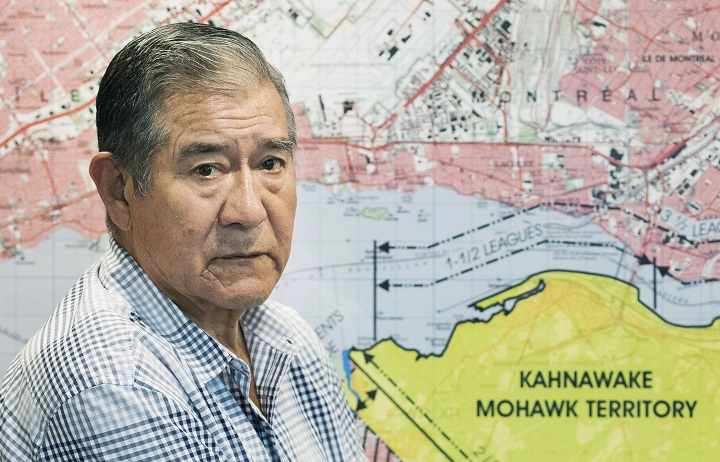For the Mohawk territory of Kahnawake, cannabis legalization is an opportunity to correct the mistakes of the past regarding tobacco.

Smoke shacks selling tax-free cigarettes are pervasive in the community across the St. Lawrence River from Montreal, and their owners have no obligation to give money back to citizens, says Joe Delaronde, spokesman for the Mohawk Council.
The federal government was part of the problem, he explained, “giving tobacco licences willy-nilly.”
“People became very frustrated with that over time,” Delaronde added. “And even though some people gave back — some just pocketed (all the revenue).”
But while lucrative tobacco shops abound in Kahnawake, selling, distributing or manufacturing cannabis on the territory remains illegal.
READ MORE: This is why Canada changed its mind on cannabis
Kahnawake is currently drafting its own cannabis legislation and taking its time to make sure citizens’ concerns are heard, said Delaronde.
“We have to build some trust here,” he explained. “We need our own laws to make sure we have control over the situation.”
Opinion in Kahnawake on legalizing cannabis sales is split.
The council recently released results of an opinion polls that surveyed 425 people in the community, 55 per cent of whom either “agreed or strongly agreed” with allowing the legal sale of cannabis on the territory.
Kahnawake’s cannabis bill could be adopted before Christmas, Delaronde said, but committees will still need to create a series of rules and regulations to compliment the law, which will ensure the final legislation only enters into force much later.
The council is also still working out if and how the community will impose a “royalty” on cannabis sales — or to tax non-Indigenous people who come into the community to buy the product.
Delaronde says charging a royalty could ensure cannabis is not cheaper on the territory than in the rest of the province.

Get daily National news
“If the price is lower in Kahnawake are we encouraging our young people to smoke more?” Delaronde asked.
READ MORE: Cannabis IQ — Legalization leaves medical users stranded, and more
The legal process Kahnawake is going through to legalize cannabis sales is highlighting a tension between the federal, provincial, and First Nations governments regarding who has final authority over the drug.
Ottawa legalized cannabis on Oct. 17 and left it up to the provinces to draft laws regulating the sale of the product on their territory.
Quebec, for instance, bans all cannabis sales outside its government-run stores.
Kahnawake, however, is located within Quebec, but its leaders are drafting a law that would create the community’s own sales and production network.
WATCH: Canada’s legal cannabis market needs 2 years to stabilize

In other Mohawk communities, such as Kanesatake, just north of Montreal, the increasing number of cannabis dispensaries is causing tension between shop operators, the band council and the police.
While in Akwesasne, a Mohawk community that straddles the Quebec, Ontario and New York state borders, its council passed what it called “interim” cannabis legislation on Oct. 17.
Until Akwesasne passes the official law, anyone on the territory wishing to “produce, sell or distribute cannabis must be licensed to do so” by the council.
Quebec’s Health Department said in a statement that the province’s law allows First Nations communities to “enter into agreements” with the province regarding cannabis legislation.
“No agreement has so far been signed,” the statement to The Canadian Press read.
And while First Nations councils are asserting jurisdiction over their territories, they are facing the reality that cannabis production is complex and many communities — at least for the moment — need help.
READ MORE: Cannabis across Canada — Volume and price of online recreational pot orders
Ghislain Picard, regional chief of the Assembly of First Nations of Quebec and Labrador, said his organization unanimously adopted a resolution stating the federal and provincial governments will not dictate laws about cannabis on their territories.
“But that being said, (the resolution) is not quite wishful thinking — but it’s not far from that either,” Picard said in an interview. “Because the capacity (to regulate cannabis) is not necessarily there yet.”
Kahnawake’s cannabis bill, for instance, is relying partly on the federal cannabis framework, and requires anyone seeking to produce marijuana on the territory to obtain a licence from Health Canada as well as the Mohawk council.
“Do we have expertise to ensure that the product is safe?” Delaronde asked. “No, we don’t. So, in order to do this properly there is no choice in the matter but to follow the guidelines and laws and parameters of what’s out there.
“Safety and health are paramount.”
READ MORE: Quebec slashes cannabis store hours due to shortages
But that doesn’t mean the Mohawks of Kahnawake aren’t interested in eventually developing the capacity to regulate cannabis entirely on their own.
“At some point,” Delaronde said, “we aren’t closing the door.”
The council has already signed a non-binding agreement with Canopy Growth Corp. that would see the First Nation host a 4,650-square-metre cannabis production facility, plus a processing and packaging space nearly half that size, in partnership with Canada’s largest cannabis company.
But despite the potential for significant council revenues and economic growth from the cannabis industry, Kahnawake wants to make sure this time around, cannabis doesn’t go the way of tobacco.
“Once the (tobacco) genie left the bottle it was too late to do anything about it,” Delaronde said. “Now we are getting ahead of the game on (cannabis). The vast majority of the people here want it regulated.”







Comments